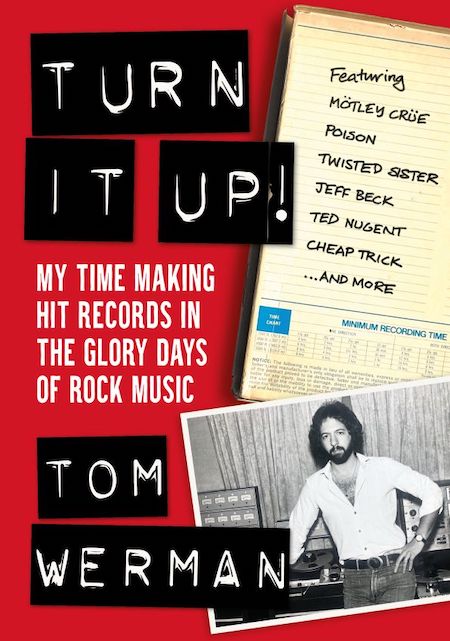As previously reported, rock producer Tom Werman will be releasing a book called, Turn It Up! My Time Making Hit Records In The Glory Days Of Rock Music, on on November 21st. Greg Prato of Songfacts spoke with Werman, some highlights from the interview, appear below.
Greg Prato (Songfacts): What made you decide to write a book now?
Tom Werman: Well, I came across a really irritating piece on me in a blog called Pop Dose. The guy never knew me, I never met him. It was really a slag, and I didn’t quite understand it. I emailed the editor and said, “Can I write a rebuttal? Can I defend myself?” And he said sure. So I did write it, he put it in the blog, and he said, “We really enjoyed this piece. Would you write more for us?” So I did. I wrote 18 episodes that covered my career and in defense. I laid out what I did, and that became the skeleton for the book.
The other reason is, I noticed a huge increase in interest in classic rock. Y’know, every town has a classic rock station. There’s maybe a hundred of them owned by iHeart Radio. I started getting a lot of podcasts, a lot of interview requests, and I felt that there was an increase in interest for this period, the ’70s and ’80s.
And I did one podcast on the making of Shout At The Devil, which has 150,000 hits. So, I said, “Yeah. OK. I’ll try and write a book.”
I wrote when I felt the spirit. I didn’t sit down and pound it out like professionals. I got lucky – I got an agent really quickly, he got a good offer from a really interesting publisher in London, and there it is. It’s amazing.
Songfacts: Was Mötley Crüe as wild and crazy in the studio as they supposedly were on tour and in their personal lives?
Werman: No. Vince [Neil] if he had a chance probably would have been crazy. Nikki [Sixx] and Tommy [Lee] dabbled with drugs for a while, but really considering their reputation, we did pretty well in turning out those three albums [Shout At The Devil, Theatre Of Pain, and Girls Girls Girls]. Especially Theatre Of Pain, which was a tough one. That was their low point I think behaviorally. And they were sandwiched between tours. They had to go out to support Shout At The Devil, and then they had to come in and write 12 or 14 songs in a hurry because there was another tour booked to support that album.
A songwriter in a band will spend many years writing songs. They’ll be good, and they’ll finally have a chance to record them for their first album. And there are maybe one or two songs left over that they didn’t do on the first album that are included on the second album, but the rest of them have to be written. It’s like, get off the road, go to sleep for 24 hours, and then write an album that is a follow-up to this big hit you just made. It’s tough, which can lead to anxiety and self-medication.
Songfacts: It seemed like the two biggest LA hair-metal bands of the mid-to-late ’80s were Mötley Crüe and Ratt. They, along with other hair-metal bands of the era, had a similar production sound. Could you sense that at the time?
Werman: No. You do what you can as a producer. It would be very difficult to say, “I want an Aerosmith sound, I want a Ratt sound, I want a Guns N’ Roses sound.” You really can’t unless you’re a genius. But what that means is, you’d rather copy somebody else than do what you think you can do best…
…If you want a certain drum sound, you can say, “Well, I’d like John Bonham‘s drum sound.” That’s one thing. But to say, “I want this album to sound like Zeppelin,” that doesn’t work.
Songfacts: Would record companies ever dictate, “Try to make it sound more like this or that?”
Werman: It’s what the band is able to do. The label has really zero input, but they do have the last word… if they want it. Some of my bands 20 years later say, “He didn’t do this,” and, “He didn’t allow us to do that.” That’s just a load. A producer doesn’t have that kind of authority – the band hires him, they can fire him. I collaborated and I may have said, “I don’t love that song. I’d rather do this song,” but that’s as far as it got.
The Twisted Sister example is the one that comes to mind. Dee [Snider] says he had to “beg me” to allow them to do We’re Not Gonna Take It. which I said, “…sounds a little bit like a nursery rhyme.” The chorus [sings melody], it’s quite simple, you can sing it in the shower, which is one of the reasons it became a hit. So, I said, “I’d rather do this song,” or, “Maybe you’d rather do this song instead.” But I never had the power to say, “No. We’re not going to do that. We’re going to do this one that I prefer.”
Unless you’re a powerhouse producer working with a band for the first time and they don’t really know what they’re doing, they may listen to you and say, “OK. Well, he’s very successful and we’re just starting out, so, we’ll do what he says.”
Songfacts: Do you think Ted Nugent‘s guitar talents tend to get overlooked due to his publicized political beliefs?
Werman: Yes. I do think he’s among the better guitarists I’ve worked with – or the best. He has his own unique style. I think he was respected in the beginning, but when he started being political, that definitely overshadowed his guitar playing. You say Ted Nugent’s name now and people only think of one thing, which is his political posture.
I tried to correct that in the book. I’m a Democrat, and sometimes my friends will say, “You still talk to Ted Nugent? How can you even work with him?” And I explain that we got along really well musically and otherwise. We didn’t talk about politics. He’s got a lot of integrity, especially compared to some of the other individuals I’ve worked with. He’s a talented guy and he loves life. I think he’s way too outspoken, but that’s what he feels he must do. We don’t relate on that level.
Songfacts: Which Ted Nugent song would you point to that really showcases his guitar playing the most?
Werman: Stranglehold. That was good. And it was a delight for me, too. That was the first song I ever mixed, or I could direct the mix. And I can remember Ted, there’s actually a postcard from him pictured in the book, saying, “Thanks. This is a great album.”
The first one [Ted Nugent, 1975], he told me on the phone, “I really like what you did with Stranglehold. But don’t EVER do anything like that again without getting my permission first.” So I was lucky.
Songfacts: Of the hit songs you produced, which was the most challenging?
Werman: Probably one that I would like to forget. Most challenging, I think it was probably one of the Twisted Sister songs [on 1984’s Stay Hungry], because we struggled for three days to get a decent rhythm guitar sound. I know some of the ones that I enjoyed that went down easy. A lot of the Cheap Trick songs went down very easily.
Read more at Songfacts.
Pre-order for Werman’s book is available at: Amazon and Barnes & Noble.

